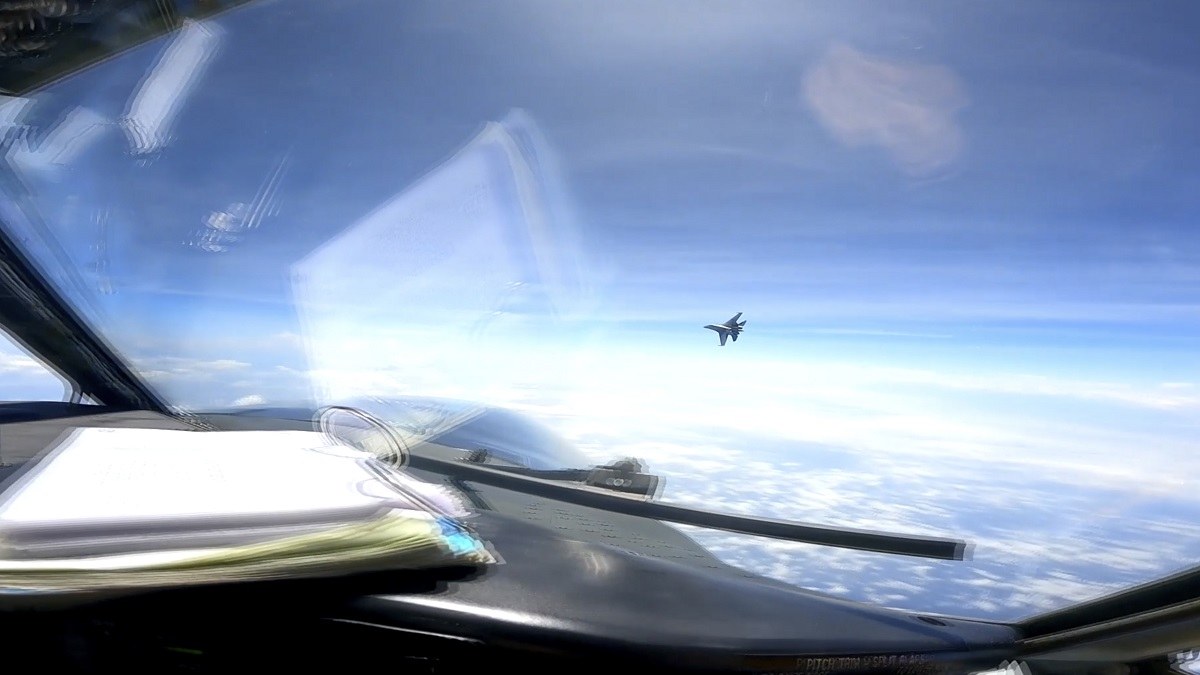
In this image from video provided by the U.S. Navy, a Chinese J-16 fighter flys aggressively close to a U.S. RC-135 aircraft flying in international airspace over the South China Sea on Friday, May 26, 2023.
10:02 JST, May 31, 2023
WASHINGTON (AP) — The U.S. military said Tuesday that a Chinese fighter jet flew aggressively close to a U.S. reconnaissance aircraft over the South China Sea, forcing the American pilot to fly through the turbulent wake.
The Chinese J-16 fighter pilot “flew directly in front of the nose of the RC-135,” which was conducting routine operations in international airspace last Friday, U.S. Indo-Pacific Command said in a statement. It called the Chinese move an “ unnecessarily aggressive maneuver.”
U.S. defense leaders have complained that China’s military has become significantly more aggressive over the past five years, intercepting U.S. aircraft and ships in the region. And tensions with China have only grown in recent months over Washington’s military support and sales of defensive weapons to self-governing Taiwan, China’s assertions of sovereignty to the contested South China Sea and its flying of a suspected spy balloon over the U.S.
In a further sign of the tensions, China said its defense chief will not meet with U.S. Defense Secretary Lloyd Austin when the two men attend a security conference in Singapore this coming weekend. Austin is scheduled to address the Shangri-La Dialogue on Saturday, while Chinese Defense Minister Gen. Li Shangfu will speak at the gathering on Sunday.
Brig. Gen. Pat Ryder, the Pentagon press secretary, said China informed the U.S. that it was declining Austin’s invitation to meet while they were at the conference. He said Beijing’s “concerning unwillingness to engage in meaningful military-to-military discussions” will not diminish the Defense Department’s commitment to seeking open lines of communication with the Chinese army.
Foreign Ministry spokesperson Mao Ning on Tuesday blamed the U.S., saying Washington should “earnestly respect China’s sovereignty and security interests and concerns, immediately correct the wrongdoing, show sincerity, and create the necessary atmosphere and conditions for dialogue and communication between the two militaries.”
In a visit to the Indo-Pacific last summer, U.S. Gen. Mark Milley, chairman of the Joint Chiefs of Staff, said the number of intercepts by Chinese aircraft and ships in the Pacific region with U.S. and other partner forces has increased significantly over that time, and the number of unsafe interactions has risen by similar proportions.
China frequently challenges military aircraft from the U.S. and its allies, especially over the strategically vital South China Sea, which China claims in its entirety. Such behavior led to a 2001 in-air collision in which a Chinese plane was lost and pilot killed. Beijing deeply resents the presence of U.S. military assets in that region, and regularly demands that American ships and planes leave the area.
In the statement Tuesday, the U.S. Indo-Pacific Command said America will continue to “fly, sail, and operate — safely and responsibly — wherever international law allows,” and expects all other countries to do the same.
"News Services" POPULAR ARTICLE
-

American Playwright Jeremy O. Harris Arrested in Japan on Alleged Drug Smuggling
-

Japan’s Nikkei Stock Average as JGB Yields, Yen Rise on Rate-Hike Bets
-

Japan’s Nikkei Stock Average Licks Wounds after Selloff Sparked by BOJ Hike Bets (UPDATE 1)
-

Japan’s Nikkei Stock Average Buoyed by Stable Yen; SoftBank’s Slide Caps Gains (UPDATE 1)
-

Japanese Bond Yields Zoom, Stocks Slide as Rate Hike Looms
JN ACCESS RANKING
-

Keidanren Chairman Yoshinobu Tsutsui Visits Kashiwazaki-Kariwa Nuclear Power Plant; Inspects New Emergency Safety System
-

Imports of Rare Earths from China Facing Delays, May Be Caused by Deterioration of Japan-China Relations
-

University of Tokyo Professor Discusses Japanese Economic Security in Interview Ahead of Forum
-

Tokyo Economic Security Forum to Hold Inaugural Meeting Amid Tense Global Environment
-

Japan Pulls out of Vietnam Nuclear Project, Complicating Hanoi’s Power Plans

























